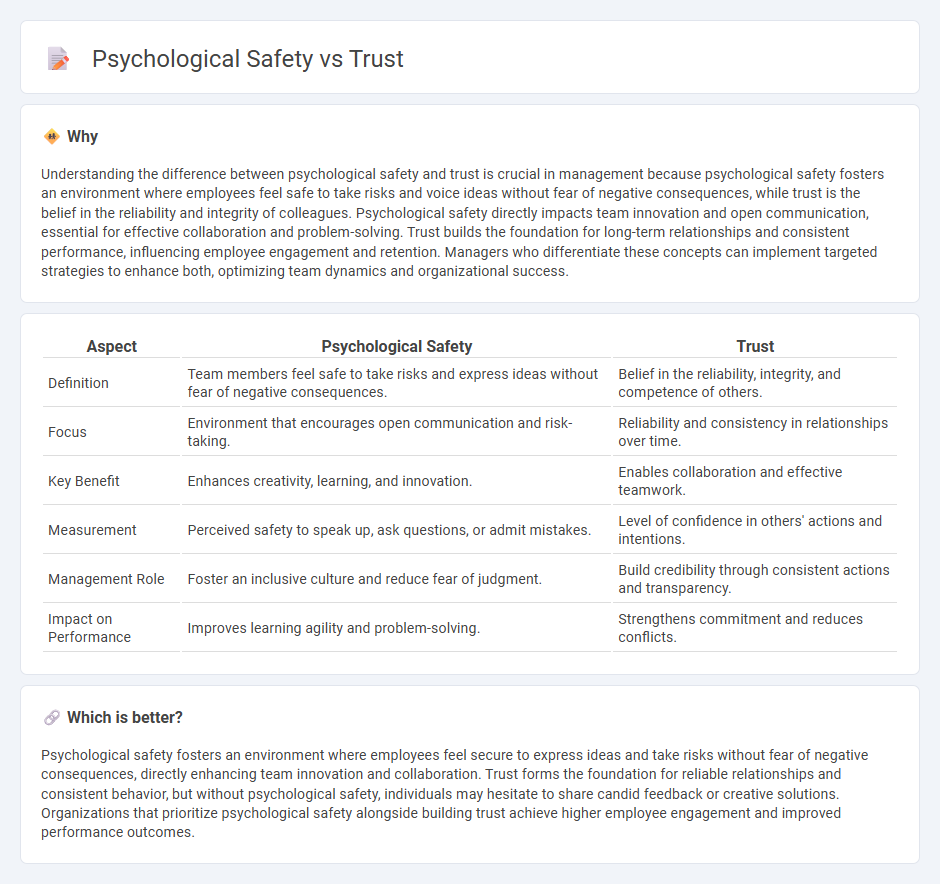
Psychological safety and trust are foundational elements that shape effective management by fostering open communication and collaboration within teams. Psychological safety allows employees to express ideas and concerns without fear of negative consequences, while trust builds confidence in leaders' intentions and team competence. Explore how integrating both concepts can enhance workplace performance and employee well-being.
Why it is important
Understanding the difference between psychological safety and trust is crucial in management because psychological safety fosters an environment where employees feel safe to take risks and voice ideas without fear of negative consequences, while trust is the belief in the reliability and integrity of colleagues. Psychological safety directly impacts team innovation and open communication, essential for effective collaboration and problem-solving. Trust builds the foundation for long-term relationships and consistent performance, influencing employee engagement and retention. Managers who differentiate these concepts can implement targeted strategies to enhance both, optimizing team dynamics and organizational success.
Comparison Table
| Aspect | Psychological Safety | Trust |
|---|---|---|
| Definition | Team members feel safe to take risks and express ideas without fear of negative consequences. | Belief in the reliability, integrity, and competence of others. |
| Focus | Environment that encourages open communication and risk-taking. | Reliability and consistency in relationships over time. |
| Key Benefit | Enhances creativity, learning, and innovation. | Enables collaboration and effective teamwork. |
| Measurement | Perceived safety to speak up, ask questions, or admit mistakes. | Level of confidence in others' actions and intentions. |
| Management Role | Foster an inclusive culture and reduce fear of judgment. | Build credibility through consistent actions and transparency. |
| Impact on Performance | Improves learning agility and problem-solving. | Strengthens commitment and reduces conflicts. |
Which is better?
Psychological safety fosters an environment where employees feel secure to express ideas and take risks without fear of negative consequences, directly enhancing team innovation and collaboration. Trust forms the foundation for reliable relationships and consistent behavior, but without psychological safety, individuals may hesitate to share candid feedback or creative solutions. Organizations that prioritize psychological safety alongside building trust achieve higher employee engagement and improved performance outcomes.
Connection
Psychological safety and trust are intrinsically linked in management, as trust forms the foundation that enables employees to feel safe expressing ideas and concerns without fear of judgment or retaliation. A high level of psychological safety enhances open communication, collaboration, and innovation, thereby reinforcing mutual trust between team members and leaders. Organizations that cultivate trust through transparent actions and supportive environments witness improved employee engagement, retention, and overall team performance.
Key Terms
Vulnerability
Trust fosters willingness to be vulnerable by creating an expectation of reliability and support, encouraging open communication and honesty within teams. Psychological safety emphasizes a safe environment where individuals feel secure to express themselves without fear of judgment or reprisal, fundamentally promoting vulnerability as a pathway to innovation and learning. Discover how cultivating both trust and psychological safety can enhance team dynamics and performance.
Reliability
Reliability forms the cornerstone of trust and psychological safety, ensuring consistent behavior and dependable support within teams. Trust hinges on the predictability of actions, while psychological safety thrives when individuals feel secure to take risks without fear of negative consequences. Explore how enhancing reliability can transform organizational dynamics and foster a culture of mutual respect.
Open Communication
Trust fosters openness by creating a foundation where team members feel confident their inputs will be valued and respected, enhancing transparent dialogue. Psychological safety ensures individuals can express ideas, concerns, or mistakes without fear of negative consequences, enabling authentic and fearless communication. Explore how cultivating both can transform workplace interactions and drive innovation.
Source and External Links
Trust | Wex | US Law | LII / Legal Information Institute - This webpage explains the legal concept of a trust, including its formation, components, and the roles of the settlor, trustee, and beneficiary.
Trust (law) - Wikipedia - This page provides an overview of trusts as a legal relationship where property is managed by a trustee for the benefit of a beneficiary, with discussions on fiduciary duties and trust types.
What is a trust: How does it work, Benefits and Types | TIAA - This webpage focuses on the benefits and types of trusts, including their role in estate planning and the differences between revocable and irrevocable trusts.
 dowidth.com
dowidth.com